Wild game like deer, elk, duck, pheasant and wild turkey are the original free-range, organic meat, even though they don’t come with snappy advertising or labels catering to shoppers looking for more healthy and ethical food choices.
It’s no secret that wild game is one of the healthiest meats available. Loaded with lean protein and omega-3 fatty acids without the added antibiotics and hormones, it is an ultra-healthy alternative to the neatly packaged meat options at big-box grocery stores.
Despite the many benefits of eating game meat, many people consider it smelly, tough and unappetizing. Jason Ellsworth, a lifelong hunter and wild game chef-for-hire, is doing his best to bust the myths and turn people on to the magic that comes from consuming what hunters harvest in the field.
Kinute caught up with Ellsworth in the middle of preparations for the opening of Buffalo Nickel Lodge, a unique 7,000-square-foot hunting destination located in the rolling hills of South Central Kansas, to chat about all things wild game.

Jason Ellsworth, hunter and wild game chef. Photo provided by Jason Ellsworth
Something about a campfire
Ellsworth is responsible for designing many of the amenities at Buffalo Nickel Lodge, which include a one-mile rifle range, a 3D archery course, Olympic-style sporting clays, and three kitchens. In addition to a full commercial kitchen, the lodge will feature an attached outdoor charcoal and wood-burning kitchen and a primitive kitchen out in the woods, which Ellsworth is particularly excited about.
Although Ellsworth often prepares fancy gourmet meals in the lodge’s top-notch commercial kitchen, he is particularly fond of simple, rustic campfire meals.
“There’s just something about a hunting camp and a campfire,” Ellsworth said. “It doesn’t allow the intrusiveness of social media. There’s nobody there looking at their phone. Everyone is involved with each other. I think that reaches back to what we were and still are.”
Ellsworth believes something in our primal DNA equates full bellies and the warmth of a campfire with storytime, something that hearkens back to the instincts we share with our distant cave-dwelling ancestors.
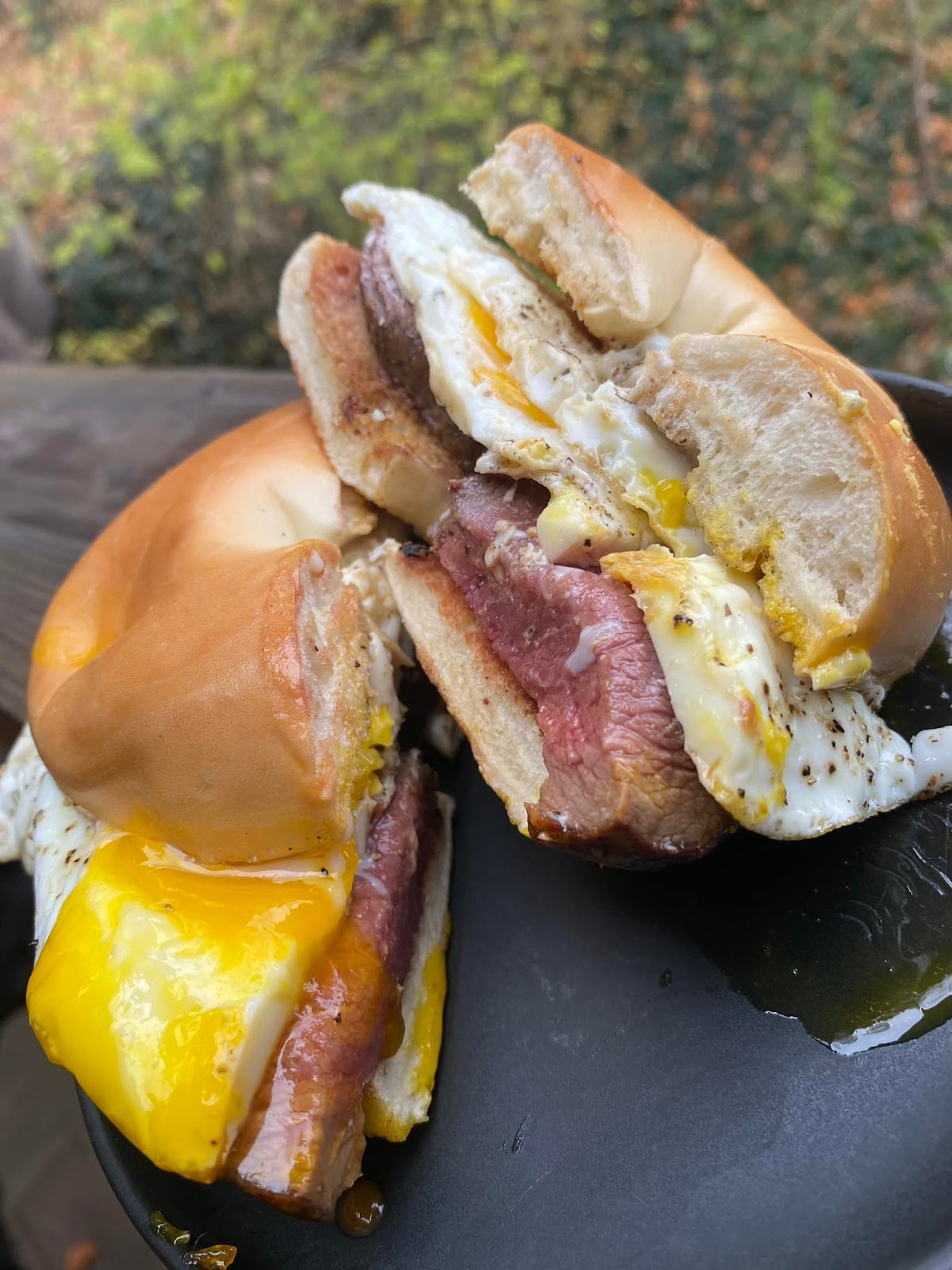
Smoked and charcoal seared venison backstrap with a farm fresh runny egg on a fresh Brooklyn bagel. Photo provided by Jason Ellsworth
“Every single person I know wants to put on a flannel and sit around a hot fire, have a belly full of something awesome, maybe a cold drink in their hand, and listen, laugh and tell stories. The warmth of that fire is still alive and well in our primal souls. It draws us in and makes us all want to be around it and just hear each other.”
How it all started
Ellsworth’s love of wild game cooking started long before Buffalo Nickel Lodge was even an idea. It also started well before he joined the Army at 17 and left his hometown in the Finger Lakes region of New York.
“I’ve always had hunting and fishing in my life. It was always like an escape,” Ellsworth said. “I was finally invited to hunt camp when I was 13. Everyone was annoyed because I was the first grandkid to go.”
Because the men in his family couldn’t exactly head to the bars after a hard day’s hunt with a 13-year-old in tow, they were worried about how they would feed themselves during their deer camp stay. Ellsworth stepped up to the plate and volunteered to cook for the whole camp.
“There was an old Weber grill in the back, and I just started cooking,” Ellsworth said. “Everybody’s got a job at hunting camp. From a very early age, I knew that feeding those guys was the way to get invited back over and over again. That kind of led to my love of cooking.”
His love of cooking also led him into the bar industry after he left the Army and later into the craft beer industry. COVID-19 hit the hospitality industry particularly hard when it swept across the country in 2020.

Hunter Breakfast — three farm fresh eggs smoked and seared venison backstrap over a spicy broccoli rabe cooked in a locally sourced pork lard. Photo provided by Jason Ellsworth
“I was watching all of my friends’ bars and restaurants close, and I couldn’t fix it. It was just driving me crazy, and I was drinking way too much. I was living a very unhealthy lifestyle.
“I realized I wasn’t being the best husband or father and that it was up to me to change it. I looked at the core of the problem, which was drinking.”
Ellsworth decided to quit drinking. However, a dry lifestyle doesn’t lend itself well to the beer industry, so he ended up leaving a very lucrative career. During a period of unemployment, a friend invited him to cook at a hunting camp in Texas. The experience made him realize that was exactly what he wanted to do, so he started his own business, Ellsworth Cooks, and became a professional camp chef.
“That snowballed into me cooking in 22 different states last year to running this crazy, high-end lodge in Kansas. It’s wild.”
How wild game gets a bad rap
Although Ellsworth loves to both eat and prepare wild game, his first experiences with game meat weren’t exactly positive.
“I was probably 8 or 9 when my grandfather handed me a well-done venison steak covered in mustard,” Ellsworth said.
The meat was so tough it made his jaw hurt. It is that first taste often cements the idea that wild meat is gross and gamey. It leaves a literal bad taste in their mouths.
“If I had judged my future with venison on that first piece, I would have never eaten it again.
“That’s the common trait with wild game. That first person who fed it to you probably had no idea what they were doing with it.
“Years later, I realized my grandfather never cooked anything. He was a cop; his breakfasts were doughnuts and coffee in the morning. I don’t think he ever cooked a dang thing in his life.”
Ellsworth claims that scene from his childhood has played out over and over again for generations of wild game haters—someone’s grandfather, who never cooked at home and had no idea what he was doing, prepared a piece of meat, fed it to a kid, and then perpetuated the idea that deer is gross.
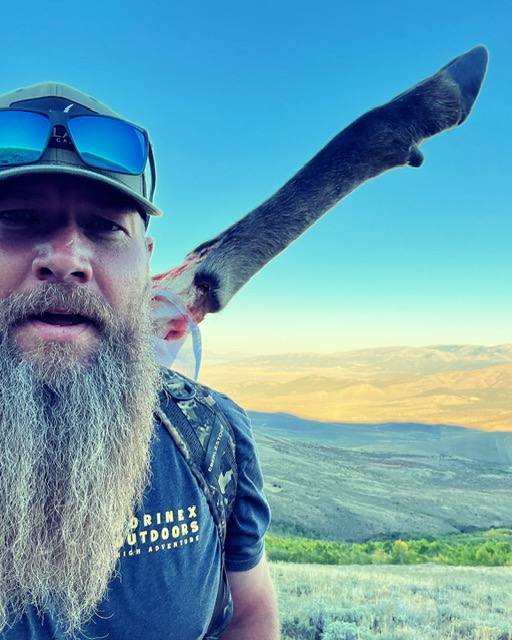
On a hunt. Photo provided by Jason Ellsworth
That formative experience lit a fire in Ellsworth, who is now determined to change those false and unfortunate perceptions.
“If I hear that some type of meat tastes bad, I want to cook it myself,” Ellsworth said. “I want to have it in my hand. I want to smell it. I want to think about what that animal was eating and then cook it on my own. Then, I can make my own decision about whether or not that animal is worth eating. I can tell you there’s been almost nothing I’ve cooked on my own where I’ve thought I’m never doing this again.
“Then I get mad because I go back to who told me something was trash and that guy’s loving Domino’s pizza. He doesn’t know anything about food. I don’t know why I ever listened to that guy in the first place.
Getting to the heart of the matter
If you ask Ellsworth what his preferred camp meal is, it doesn’t take long for him to thumb through the thousands of recipes in his mental Rolodex and pull out his favorite.
“The venison heart from the day before in some kind of fajita. It’s really tough to beat,” Ellsworth said without hesitation. “When you break it down the right way and cook it with peppers, onions, and eggs and put it in some kind of corn tortilla, that is one of my favorite things to cook.”
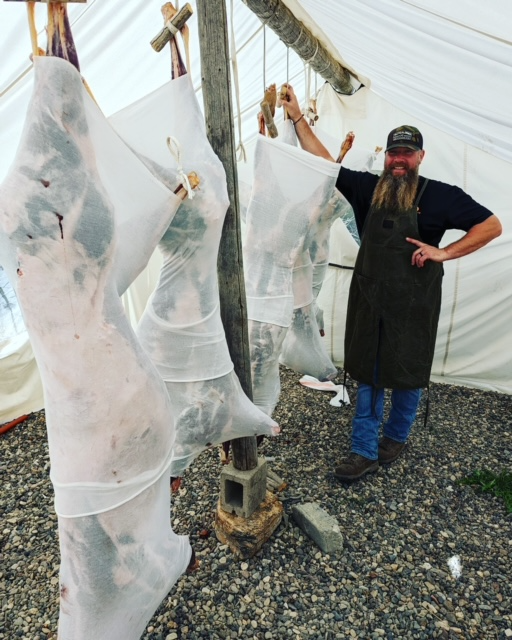
Dry aging whole deer. Photo provided by Jason Ellsworth
He acknowledges that most hunters leave the heart of their kills discarded somewhere in a tangled pile of the animal’s innards, which he finds highly frustrating.
“People equate the heart with life, and it’s such a shame to me when people leave that in the woods,” Ellsworth said. “It’s one of my top three favorite cuts. The other two are backstraps and tenderloins, but everybody loves those things.
“I think to honor the animal, to do everything justice, you don’t leave that in the woods. You bring the heart back, prepare it, and feed it to folks.”
Although venison heart tops the list of Ellworth’s favorite wild game meals, he hasn’t always been a fan. He was once guilty of tossing this choice cut aside as waste when field-dressing an animal. And because Ellsworth loves a good story as much as he loves a good meal, he was excited to share how his mind was changed.
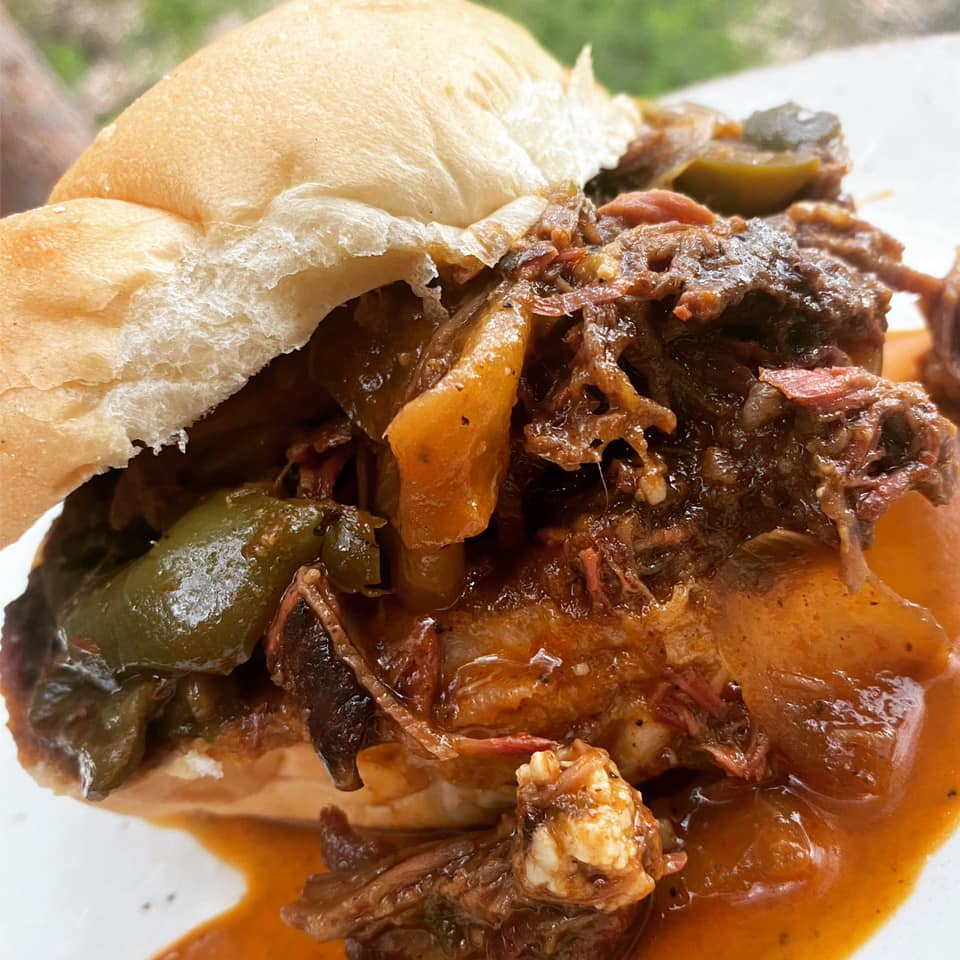
Smoked and braised venison shoulder Barbacoa sandwich — “I smoked an entire whitetail front shoulder for 3 hours at 225° then braised it in beef stock and red wine for another 3 hours at 300°, served on a hard roll.” Photo provided by Jason Ellsworth
“It’s one of the coolest stories I have,” Ellsworth said. “This older guy named Chuck brought me hunting on his property, and I shot a small buck in the morning.”
“Where’s your heart?” Chuck asked while they were breaking down the animal.
“It’s back in the pile,” Ellsworth told him.
“Care if I have it?” Chuck asked.
“No problem, dude. It’s yours,” Ellsworth replied.
“Alright,” Chuck said, “but this will be the last one you ever give away.”
Ellsworth admits he rolled his eyes, thinking, “Here we go. Some old guy is going to tell me I need to eat my heart. What is he going to do? Pickle it?”
While Chuck didn’t pickle the heart, he did things to it that Ellsworth had never seen.
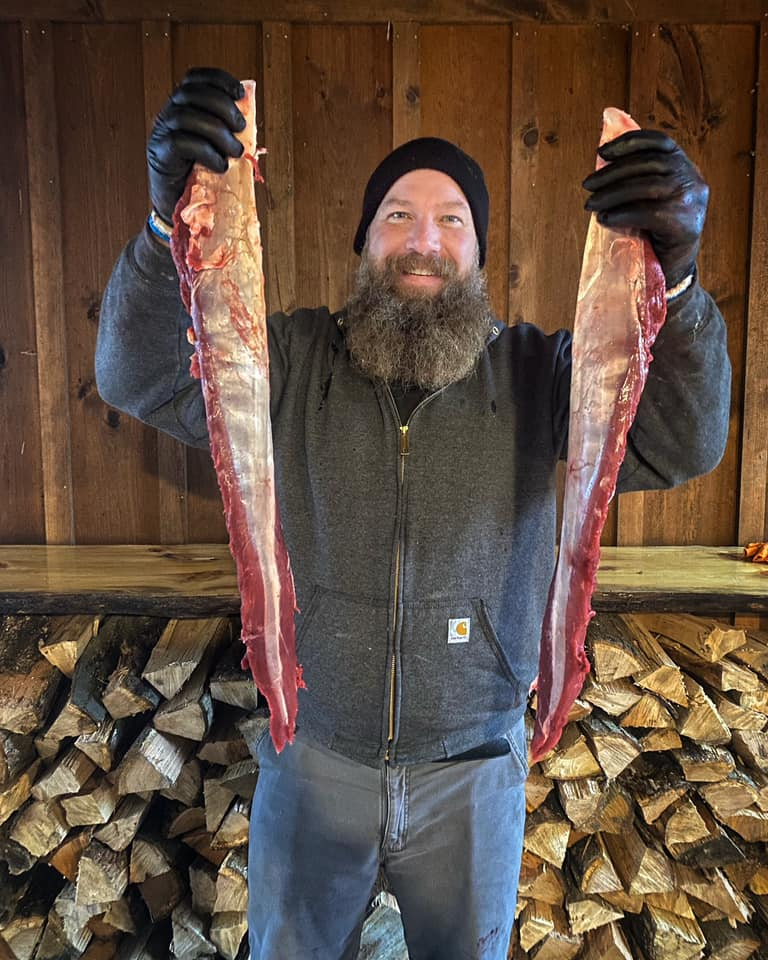
“What do you think he scored” — A poke at the guys who are obsessed with antler size. Photo provided by Jason Ellsworth
“It was like he unrolled it,” Ellsworth said. “He takes all the ventricles out and takes great care with this thing.”
When Chuck had worked his magic, the heart looked more like a flank steak than a blood-pumping vital organ.
“He cuts it against the grain, and he’s got butter in the pan and peppers and onions cooking in that pan,” Ellsworth said. “When the peppers and onions are almost done, he throws in the heart for maybe two or three minutes until it’s medium rare. Then he puts a couple of eggs in there with it, and finally puts it in front of me.”
Ellsworth was still skeptical, but after all the care the old man put into preparing that meal, he realized saying “no” would be a jerk move.
“So I’m eating it, and it blew my mind,” Ellsworth said. “I could not believe I had ever left that in the woods.”
That’s when Ellsworth knew he would never leave another heart in a gut pile. He also became determined to carry on Chuck’s tradition of changing people’s minds.
“I ask people about their hearts all the time. Like Chuck, I promise them it will be the last one they ever give away. That ripple effect has happened through every hunting camp I’ve been a part of for the past 25 years. Every single one of the guys I hunt with consumes their hearts now.”
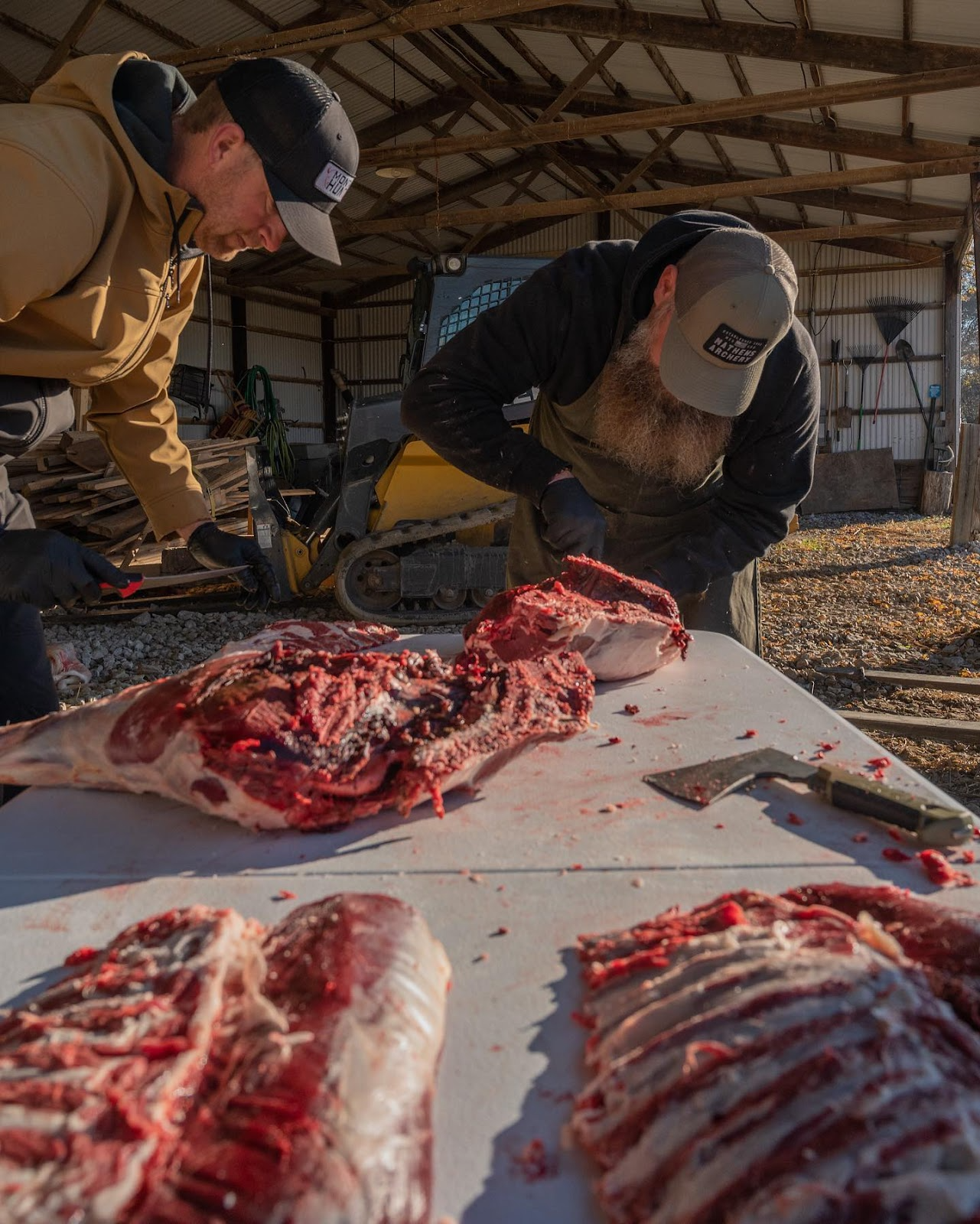
Butchering a few whitetail deer with pro fisherman John Hoyer to make bone in venison chops. Always something to learn. Photo provided by Jason Ellsworth
Processing wild game
Ellsworth is also frustrated with people dropping their deer off at a processor instead of butchering the animals.
“I’m a huge proponent of people butchering their own animals. It only takes some confidence to do it the right way,” Ellsworth said. “It’s a two- to three-hour project to take your deer from hanging to vacuum sealed. It’s not that hard. People just don’t know where to start. I feel like most people that are hunters now, the new generation of hunters, don’t know how easy it is.”
Since not everyone grew up watching their grandfathers and uncles butcher deer, Ellsworth is organizing a four-day school to teach people the art of whole-animal butchering. He believes passing on proper butchering knowledge is particularly important with the surge of new hunters that have hit the fields in the past few years.
He wants people to save the money they would spend dropping their deer off at a processor, give up making the animal into highly processed cheddar dogs, and instead enjoy meat that’s crazy healthy. But saving money and healthy meat aren’t the only reasons Ellsworth promotes processing your own meat.
“That was one of the bonding things with our family. We would have a few deer on the ground, and then it would be time to get to work. The old men laughing in the barn and butchering meat are formative memories.
“It’s such a huge miss to drop an animal off at the processor. It’s easy, but you miss out on how good the hard can be.”
